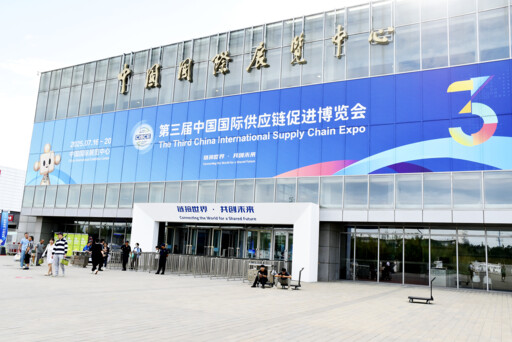


Ensuring security, stability of China’s industrial and supply chains amid global restructuring

The 3rd China International Supply Chain Expo at the China International Exhibition Center (Shunyi Venue), Beijing, July 16-20th Photo: IC PHOTO
The security and stability of industrial and supply chains are key pillars of China’s accelerated efforts to foster a new pattern of development focused on the domestic economy and featuring positive interplay between domestic and international economic flows. It is also a core element in safeguarding national economic security. Today, as deglobalization becomes increasingly evident and global industrial chains undergo rapid restructuring, it is crucial to clarify the core logic and policy orientations for ensuring the security and stability of China’s industrial and supply chains in order to advance the steady, healthy development of the Chinese economy.
While the restructuring of the global industrial chain intensifies the risks associated with instability, weakness, and insecurity in China’s industrial and supply chains, transformations in the global economic governance system present new opportunities for China to address these risks. First, it prompts China to update its independent innovation strategy. Heightened tensions in the global supply chain could increase China’s reliance on domestic production, compelling local businesses to accelerate technological innovation and iterative upgrading. Second, China can seize this opportunity to overcome the predicament of “middle- and low-end lock-in.” As global industrial and supply chain adjustments tend to be region-specific, accelerating the construction of regional value chains and expanding the scale of “chain master” enterprises to further integrate into the specialization network of the global value chain offer potentially important pathways for China to break free from this structural constraint.
Amid the restructuring of the global industrial chain, China’s industrial and supply chain development is exhibiting new characteristics and trends, yet its inherent logic remains consistent.
First, achieving self-reliance and enhanced risk control constitute the prerequisite for ensuring the security and stability of China’s industrial and supply chains. This entails independent, in-depth, dynamic, open, and long-term development of industrial and supply chains in order to maintain their resilience in the face of external shocks.
Second, breaking through the bottlenecks in critical core technologies is a vital step for ensuring the security and stability of China’s industrial and supply chains. Innovation in core technologies is a major driving force for industrial and supply chain development, while domestic substitution is a key strategy in response to the restructuring of the global industrial chain. In the later stages of China’s industrialization, a fundamental direction of domestic substitution lies in core materials, core components, core equipment, core processes, and core algorithms enabled by critical core technologies.
Third, the development of new quality productive forces is the core driver of China’s industrial and supply chain security and stability. These innovation-led forces prioritize the leading role of new industries, and their deployment in strategic emerging industries and future industries can enhance technical support for the security and stability of industrial and supply chains.
Fourth, securing rule-making power is an effective safeguard. In the global market, rules often shape resource acquisition methods and competitive positions. Gaining rule-making power helps enhance China’s autonomy in global economic governance, allowing it to establish standards aligned with its own development needs while promoting the stable development of global industrial and supply chains through international cooperation.
Fifth, cooperation and mutual benefit form an essential development direction. While domestic efforts must be prioritized, international resources and markets should also be leveraged to supplement domestic market demand and meet people’s daily needs. Moreover, the security and stability of industrial and supply chains affect overall socioeconomic development and provide crucial support for building a community with a shared future for humanity. China’s vast and open domestic market not only facilitates global cooperation—benefiting people worldwide—but also contributes to the efficient flow of resources, thereby enhancing the security and stability of global industrial and supply chains.
Huang Qinghua (professor) and Pan Ting are from the College of Economics and Management at Southwest University.
Editor:Yu Hui
Copyright©2023 CSSN All Rights Reserved